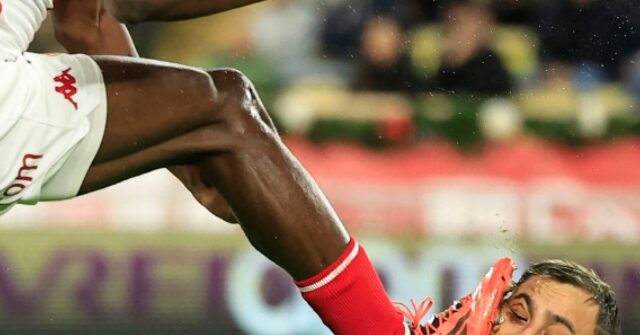Gianluigi Donnarumma, the goalkeeper for Paris Saint-Germain (PSG), endured a serious facial injury during a match against AS Monaco at Stade Louis II. The incident occurred in the first half when Donnarumma made an impressive save against Monaco’s player Wilfried Singo. However, the thrilling save came with a hefty price, as Singo’s cleat made direct contact with Donnarumma’s face, resulting in a deep gash. The intensity of the game was amplified by this injury, which highlighted the perils goalkeepers often face during matches.
Following the incident, Donnarumma was unable to continue playing due to the severity of the wound. Despite the nature of the play that resulted in his injury, Singo was not penalized by the referee, which left Donnarumma frustrated. During halftime, he sought clarification from the officials regarding the lack of a penalty for the incident. This moment showcased Donnarumma’s competitive spirit and his willingness to stand up for himself and the fairness of the game, even in the face of injury.
The damage to Donnarumma’s face required medical attention, with reports indicating that he received ten stitches to close the gash on his right cheek. Despite the traumatic experience, Donnarumma took to social media to reassure his fans of his well-being by sharing a picture of himself with his dog. This gesture not only calmed his supporters but also demonstrated his resilience in the face of adversity, illustrating a personal side outside of his role as a football star.
Contrary to the drama surrounding his injury, the match itself ended positively for PSG, with the team securing a 4-2 victory over Monaco. This result was crucial for PSG as they aim to maintain their position at the top of the league. The team’s performance, despite the challenge posed by Monaco, reflects their overall strength, but Donnarumma’s injury served as a reminder of the risks players face during high-stakes matches and their impact on team dynamics.
The incident also sparked conversations about player safety and officiating standards in football. The lack of a penalty for such a significant play raised eyebrows among fans and analysts alike, leading to discussions regarding the need for stricter guidelines to protect players, particularly goalkeepers, from reckless challenges. Donnarumma’s situation serves as a catalyst for broader conversations about player welfare and the responsibilities of referees in assessing dangerous play.
Ultimately, while Gianluigi Donnarumma’s injury was unfortunate, it has not overshadowed PSG’s victory or his determination to recover. The support he received from fans and the club underscored the community spirit within football, where athletes often rally around one another during challenging times. As Donnarumma heals, his focus will likely shift back to training and preparing for future matches, where he will aim to continue showcasing his skills and contributions to PSG’s success.

